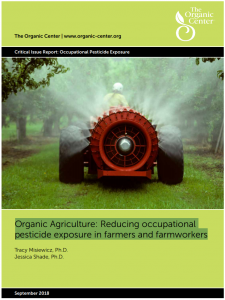Farmworkers at risk from chemicals but organic can help, shows new report
Farmworkers at risk from chemicals but organic can help, shows new report
The Organic Center delves into research studies to prove organic is safer for our farmworkers
WASHINGTON, D.C. (Sept. 12, 2018) – The millions of farmworkers who labor on our farms across the country are vitally important to the success of agricultural operations. They help plant and harvest the crops, tend to the livestock, maintain the farm equipment, and manage the weeds and the pests. They are literally agriculture’s boots on the ground and hands in the dirt.
But those men and women who are on the front line of our bountiful agricultural system and who are an invaluable part of the robust American farming sector are also at greatest risk for exposure to agricultural pesticides and the adverse health impacts that can occur as a result of that exposure, according to a timely and important report from The Organic C enter.
enter.
Clean and healthy food and a clean and healthy environment are critical concerns for all of us, and are the core principles at the heart of the organic movement. However, while organic agriculture bans the use of most pesticides and reduces exposure to these toxic chemicals, the sustained use of agricultural chemicals by conventional agriculture is having widespread and negative unintended consequences on our valuable farm workforce.
With funding provided by the UNFI Foundation, The Organic Center report synthesizes 129 research studies from around the world that cover topics ranging from the impacts of toxic, synthetic pesticides on the health of farmworkers and farm communities, to the science supporting the efficacy of chemical-free pest control to demonstrate how organic certified production can substantially benefit those working in agricultural systems.
“The health and safety of those who produce our food should be a concern for all of us, and consumers can take action to support healthy farming communities by choosing food grown organically,” said Dr. Jessica Shade, Director of Science Programs for The Organic Center. “We hope this report sheds light on this critical issue.”
There is growing awareness of how the sustained use of agricultural chemicals affects our health and our environment. A recent court decision awarding a groundskeeper who was diagnosed with terminal cancer after regularly using Roundup (glyphosate) pesticide almost $300 million in damages from the pesticide’s maker captured headlines everywhere. Consumers often cite reduced pesticide exposure and environmental stewardship as the top reasons to choose organic.
Beyond our kitchens and homes, organic systems greatly reduce risks for farmworkers and agricultural communities by not using toxic, synthetic pesticides. The Organic Center study looks at how adult farmers and farmworkers are exposed to pesticides, the negative health consequences of those exposures, organic production practices and processes used by organic agriculture to protect farmers and farmworkers, and an overview of pest management practices that can be implemented in any farming system to reduce the need for pesticides.
1.1 billion pounds and 1,400 pesticides
Over 1.1 billion pounds of agricultural chemicals are used annually in the United States, and pesticide exposures on conventional farms cause thousands of illnesses every year. A large body of research documents the health risks associated with both short- and long-term exposure to pesticides: cancer, neurodegenerative disorders and poor reproductive health. Even with the best management practices while handling and applying pesticides, farmers and farmworkers are still at risk for exposure. The adoption of organic techniques that avoid the use of toxic, synthetic pesticides provides the surest safeguard against chemical-related occupational health problems.
Almost 1,400 pesticides with over 900 active ingredients are registered with the Environmental Protection Agency (EPA) and approved for use in the United States. Organic farmers are required by law to follow strict standards set forth by the National Organic Production Act that include implementing cultural methods to control pests before any pest control substance may be applied. Some of the most common cultural practices utilized by organic farmers to manage pests include crop rotations, intercropping, the use of buffers and hedgerows, and the promotion of soil health to balance the farm ecosystem.
In cases where these practices are ineffective in combatting a pest, organic farmers are allowed to use naturally occurring pest control products and restricted to about 25 synthetic materials approved by the National Organic Standards Board and deemed to pose little threat to humans and the environment. These substances undergo review every five years to assess any new knowledge of risk to humans and the environment, and to ensure protection of the population most vulnerable to the adverse health effects of pesticide exposure.
By definition, pesticides are toxic to living organisms, so it is not surprising they can also be toxic to the environment and humans. While the adverse effects of pesticides on beneficial insect predators, song birds, pollinators and native plants are well documented, the unintended effects of pesticides on humans are perhaps the most concerning. Farmers and farmworkers, who are exposed to pesticides at higher doses and with greater frequency than the general public and often exposed to pesticides significantly more toxic because they are restricted from use by the general public, are at the greatest risk to the serious consequences of exposure.
“Practices used by organic producers to support robust agroecosystems to naturally combat pests can reduce chemical inputs in any farm setting,” said Dr. Shade. “By shifting to more sustainable farming systems that rely on balanced ecosystems as a first line of defense against pests, we can ensure sustainable food security and healthy farm communities into the future.”
The Organic Center's mission is to convene credible, evidence-based science on the health and environmental impacts of organic food and farming and to communicate the findings to the public. The Center is an independent non-profit 501(c)(3) research and education organization operating under the administrative auspices of the Organic Trade Association.


